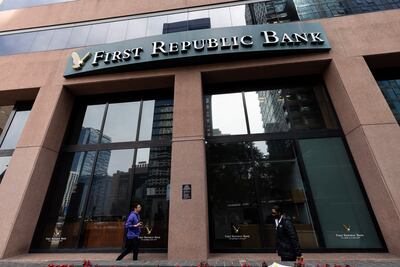Credit Suisse became the latest lender to run into trouble this week, exacerbating fears that another banking sector-induced global financial crisis is about to unfold.
This has raised questions on how long this period of uncertainty would last, despite regulators and the banking sector having been swift to step in to assuage those concerns and prevent another damaging meltdown to ripple through the world.
A potential credit crisis could happen as "rapidly tightening monetary policy could create dislocations in funding markets and raise pressure on banks with widening asset-liabilities mismatches", analysts at German financial services firm Allianz wrote.
"The SVB failure is certainly a bellwether of growing frictions in the financial system," it said, referring to Silicon Valley Bank, which put the spotlight on the current crunch in the sector.
Three of the four banks that failed over the past week were from the US, and all are heavily involved in the technology sector, particularly with start-ups and cryptocurrency.
There have been 563 bank failures in the US from 2001 to 2023, with 414 occurring between 2008 to 2011 alone and peaking at 157 in 2010, latest data from the US Federal Deposit Insurance Corporation shows.
The problems were highlighted with last week's sudden collapse of Silicon Valley Bank, a California-based lender that largely catered to technology and start-up clients.
Silvergate Capital: an FTX victim
However, before SVB failed, Silvergate Capital, a New York-based lender heavily tied to the cryptocurrency sector, announced on March 8 that it will be winding down its operations amid a meltdown in the market.

The bank was seen as another victim to the collapse of FTX, once one of the biggest cryptocurrency exchanges in the world that went bankrupt in November. In its fourth-quarter earnings report, Silvergate said it lost about $1 billion after its clients withdrew $8.1 billion. Around 90 per cent of its assets were tied to the technology sector.
The bank, along with Signature Bank, have been considered to be among the most crypto-friendly banks in the US, and their demise has resulted in uncertainty on where crypto companies would turn to for cash.
“These were the two most Bitcoin-friendly banks, supporting the lion’s share of fiat settlement for Bitcoin trades between trading counterparties in the US,” Mike Brock, chief executive of TBD at crypto platform Block, wrote in a post on Nostr.
Silicon Valley Bank: the trigger
US regulators seized SVB and placed it on receivership on March 10 in a bid to protect its investors after a bank run. It became the second-biggest bank failure in US history after Washington Mutual's collapse in 2008, which in turn triggered the global financial crisis.

The fallout from SVB's demise was swift: it rattled global stock markets, which lost around $465 billion in value, and became the trigger for the growing worries of another financial crisis.
The FDIC had created a bridge bank that now holds the deposits and assets of SVB's former clients, a majority of which have deposits that are up to millions of dollars above the $250,000 threshold the FDIC insures.
When word began to spread that the bank could be insolvent — as government bonds it purchased in the past few years were now drastically declining in value following recent interest rate hikes — many of those firms moved to pull their money out of SVB.
"The bank run was the final nail in the coffin, and many SVB customers were unable to transfer their funds before the bank entered into receivership and withdrawals were paused," analysts at blockchain platform Chainalysis wrote.
First Republic Bank: fate to be determined
First Republic Bank, a San Francisco-based midsized lender, experienced a volatile week in trading, seeing wild swings in its stock price after the collapses of SVB, Signature Bank and Silvergate Capital.

Eleven major US banks came to its rescue, announcing $30 billion in deposits to help shore up the troubled financial institution. Those banks included JP Morgan, Bank of America, Citigroup and Wells Fargo, which each contributed $5 billion of uninsured deposits.
The action is a reflection that the US banking system "has strong credit, plenty of liquidity, strong capital and strong profitability. Recent events did nothing to change this", the banks said in a statement.
It remains unclear how much this liquidity injection will change the fortunes of First Republic.
US Treasury Secretary Janet Yellen also sought to calm fears, telling the Senate Finance Committe that the US banking system "remains sound, and that Americans can feel confident that their deposits will be there when they need them".
Signature Bank: 'SVB-generated panic'
Signature Bank, the New York-based lender at par with Silvergate in terms of significant ties to cryptocurrency, became the third-biggest failure in US banking. It was taken into receivership by the FDIC, which also guaranteed the deposits of their clients.

As with Silvergate, Signature was trapped in the downturn of the crypto market, and its collapse was the result of an "SVB-generated panic", as described by the Wall Street Journal, with depositors withdrawing more than $10 billion in a single day. Regulators said its failure presented a systematic risk to the US financial system.
After these US banks' failures, lenders are expected to become even more conservative in their lending, Allianz analysts said.
"Over the near term, financing conditions are bound to tighten further in the US economy [and other countries] as banks raise lending standards and carefully safeguard their liquidity positions, further retrenching credit," they said.
Credit Suisse: can UBS make it work?
Credit Suisse, which is considered one of the global systemically important banks, threw more fuel to the fire after its top shareholder said it would not be adding further investment.
Shares of the Zurich-based institution dove, but rebounded on Thursday after the Swiss central bank announced it was throwing a $54 billion lifeline to the lender — the first such move from a central bank since the 2008 crisis.
Fellow Swiss lender UBS is in talks to buy Credit Suisse, the Financial Times reported on Friday, citing sources familiar with the situation.
A full merger between the two banks would create one of the biggest financial institutions in Europe. UBS has around $1.1 trillion of assets, while Credit Suisse has about $575 billion.


